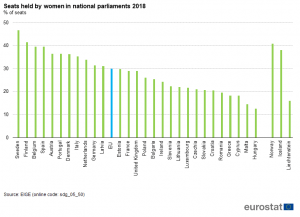This week’s reading by Kari Norgaard and Richard York, introduced us to the concept of environmentalism, the government, and gender equality. It was a concept I never really put together until now. The environment is a hot topic around the world, especially in political arenas. Many world leaders are ultra focused on climate policies and how to implement the best plans to help cut back their total emissions and reduce their carbon footprint. According to Norgaard and York, women who hold political office tend to be more proactive about environmental issues. I found this claim to be true as I began doing my own independent research.

Jacinda Ardern, the Prime Minister for New Zealand is very passionate about climate control issues. Ardern has called the climate emergency her generation’s “nuclear free moment” and made tackling it a priority for her coalition government.”(AingeRoy) The New Zealand government is taking large steps toward reducing their emissions drastically by 2050. They have committed to planting a billion trees, implemented strict policies for farmers to reduce their emissions or face extremely high taxes, and putting a cap on the number of cows that dairy’s can have. New Zealand’ Environmental Performance Index (EPI) is currently ranked number 17 in the world by the UN. Ardern is pushing for net zero emissions by 2050, from watching her speak, it appears as though she is passionate about seeing that come to fruition. https://youtu.be/Dp5Ue9v2v7g
 The information about New Zealand’s Prime Minister Jacinda Ardern falls in line with York and Norgaard’s findings. Their research suggests that “nations with greater gender equality may be more prone to protecting the environment.” We see this with New Zealand, Denmark, Germany and Norway. “Women tend to take environmental risks like nuclear power or toxic substances more serious than men do.” (Norgaard & York 508). It’s not surprising that women tend to think more along the lines of environmental protection. Women have been conditioned by society to be nurturers and caregivers. Given that it would be natural that women would be more concerned about the air they breathe or the water their children drink and so on.
The information about New Zealand’s Prime Minister Jacinda Ardern falls in line with York and Norgaard’s findings. Their research suggests that “nations with greater gender equality may be more prone to protecting the environment.” We see this with New Zealand, Denmark, Germany and Norway. “Women tend to take environmental risks like nuclear power or toxic substances more serious than men do.” (Norgaard & York 508). It’s not surprising that women tend to think more along the lines of environmental protection. Women have been conditioned by society to be nurturers and caregivers. Given that it would be natural that women would be more concerned about the air they breathe or the water their children drink and so on.

The Prime Minister of Denmark Mette Frederiksen, is another woman who is leading her country on the road to reducing their emissions. Her pledge to cut greenhouse gas emissions by 70% by 2050 is laid out in an 18 page agreement titled “a fair direction for Denmark.” In this agreement she pledges to cut the sale of new diesel and petrol cars by 2030. “As it is, Denmark reached an emissions reduction of 35% in 2018” (Stam June 2019). Denmark’s EPI score is 3rd in the world according to 2018 data by the Environmental Performance Index.
In 1990, the “UN estimated that in order for women to influence key outcomes and be taken seriously, a threshold of 30% of women in parliament was required. As of 1999, only 8 of the 130 nations met this threshold.” Those nations included Denmark, Finland, Netherlands, South Africa, Germany, Iceland, Norway and Sweden (Norgaard & York 514). These numbers have increased since 1999. Below is a graph showing the number of seats held by women in across various national Parliaments. In 2018, Sweden had the leading number of women in its Parliament reporting at 47%. Sweden ranks number 5 in the world on their EPI. Despite the fact that their leader is a male, they have a large number of female members in their Parliament.

Norgaard and York posits that “gender equality and environmental concern are linked to the relationship between gender and the environment. ” Their study suggests that “societies that are less sexist are more environmentally responsible.” They mention further that a country like Singapore for example has a very low number of women in Parliament. As such, their environmental record is poor, ” holding one of the 10 worst environmental records in the world” (Norgaard & York).
 It’s a shame that the United States still has a disproportionate numbers of women in high ranking government positions. Women make up only 26% in the Senate and 23% in the House. The United States has an EPI score of 27 as of 2018. That number is not likely to rise with Trump in office. Alexandria Ocasio-Cortez is very vocal about climate change and is trying to come up with ways to cut emissions in the U.S. You can view her speech here; https://youtu.be/Whrwt5m9jHw This is further proof that women take on the challenge of environmental issues in a big way. “The youngest woman to be ever elected to congress, and an example of a millennial in power, AOC has been using her political position to draw attention to social and environmental issues as well as women’s rights and equality. Her work on and in promoting the Green New Deal in the U.S. has made her the voice of climate change concern in a political environment heavily criticised for climate change denial” (Wyns, A). AOC has moxy, she isn’t afraid to fight for what she believes in. With more women like her in the American government, we may have a chance for equality.
It’s a shame that the United States still has a disproportionate numbers of women in high ranking government positions. Women make up only 26% in the Senate and 23% in the House. The United States has an EPI score of 27 as of 2018. That number is not likely to rise with Trump in office. Alexandria Ocasio-Cortez is very vocal about climate change and is trying to come up with ways to cut emissions in the U.S. You can view her speech here; https://youtu.be/Whrwt5m9jHw This is further proof that women take on the challenge of environmental issues in a big way. “The youngest woman to be ever elected to congress, and an example of a millennial in power, AOC has been using her political position to draw attention to social and environmental issues as well as women’s rights and equality. Her work on and in promoting the Green New Deal in the U.S. has made her the voice of climate change concern in a political environment heavily criticised for climate change denial” (Wyns, A). AOC has moxy, she isn’t afraid to fight for what she believes in. With more women like her in the American government, we may have a chance for equality.
It’s important that nations begin to equal out the number of men and women in high ranking government offices. It’s imperative for gender equality. It’s not only important for equality, but for our planet. We need an equal balance for equality. When one class has more power than another, oppression occurs. Environmental organizations like WEDO can help create awareness and empowerment among women to join the environmental fight. The more empowered women feel the more apt they are to get involved in government, to enact policy change. We saw this happen in congress in 2018 Trump’s election.
Annotated Bibliography Eleanor AingeRoy is a journalist for the Guardian. She graduated from the University or Technology in Sydney. She was a freelance journalist prior to becoming a full-time writer for the Guardian. She is only 25, but tackles some very heavy story lines including covering the current Covid-19 outbreak in New Zealand.
Sources;
Ainge, E., Climate change to steer all New Zealand government decisions from now on, 12/2019, accessed 3/22/2020. https://www.theguardian.com/world/2019/dec/04/climate-change-to-steer-all-new-zealand-government-decisions-from-now-on
Davidson, J. AOC Reads the Green New Deal Into the Congressional Record 2/27/20, accessed 3/21/2020 https://www.ecowatch.com/aoc-green-new-deal-2645318946.html
EPI https://epi.envirocenter.yale.edu/2018/report/category/hlt
EU Stats, Women in EU parliament and governments https://ec.europa.eu/eurostat/web/products-eurostat-news/-/EDN-20190306-2
HerStory https://wedo.org/about-us-2/
Norgaard, Kari and Richard York. “Gender Equality and State Environmentalism.” Gender and Society August 2005: 506-522.
McDonald, J. New Zealand Takes the Lead on Climate Change, The Diplomat, 11/2019, accessed 3/22/2020. https://thediplomat.com/2019/11/new-zealand-takes-the-lead-on-climate-change/
Stay, C. New Danish government puts climate change centre stage, 6/2019, accessed 3/21/2020 https://www.euractiv.com/section/climate-environment/news/new-danish-government-puts-climate-change-centre-stage/


This web site certainly has all of the information I
wanted concerning this subject and didn’t know who to ask.
I think this is one of the most significant info
for me. And i’m glad reading your article. But want
to remark on few general things, The website style is perfect, the articles is
really great : D. Good job, cheers
I think the admin of this website is truly working hard in support of
his website, because here every data is quality based data.
Do you mind if I quote a couple of your articles as long as I provide credit and sources back to your blog?
My blog site is in the very same niche as yours and my users would really benefit from
some of the information you provide here. Please let me know if this alright with you.
Thanks!
After exploring a number of the articles on your web page, I really like your technique of blogging.
I book marked it to my bookmark webpage list and will be checking back soon.
Please visit my web site too and let me know what
you think.
Good article. I’m going through some of these issues as well..
I’m not sure why but this weblog is loading incredibly slow for me.
Is anyone else having this issue or is it a problem
on my end? I’ll check back later and see if the problem still exists.
This piece of writing will help the internet visitors for
creating new web site or even a blog from start to end.
What’s up to every body, it’s my first visit of this blog; this website includes awesome and really fine stuff
in favor of visitors.
I used to be recommended this blog by way of my cousin. I’m no longer sure whether or not this publish is written by him as no one else
understand such particular approximately my problem.
You are wonderful! Thanks!
Write more, thats all I have to say. Literally,
it seems as though you relied on the video to make your point.
You clearly know what youre talking about, why waste your intelligence
on just posting videos to your weblog when you could be giving us something informative to read?
I all the time emailed this blog post page to all my friends, because if like to read it then my contacts
will too.
I was recommended this website by my cousin. I am not sure whether this
post is written by him as no one else know such
detailed about my problem. You are incredible! Thanks!
Great post however I was wondering if you could write a litte more on this topic?
I’d be very thankful if you could elaborate a little bit further.
Bless you!
I know this if off topic but I’m looking into starting my
own blog and was curious what all is needed to get
set up? I’m assuming having a blog like yours would cost
a pretty penny? I’m not very internet smart so I’m
not 100% sure. Any tips or advice would be greatly appreciated.
Thank you
Hello there! This article could not be written any better!
Going through this article reminds me of my previous
roommate! He continually kept preaching about this. I am going to send this
article to him. Fairly certain he will have a good read.
Many thanks for sharing!
Excellent post. I was checking continuously this blog and I’m inspired!
Extremely helpful information specially the last part 🙂 I handle such info a lot.
I was looking for this certain information for a long time.
Thank you and best of luck.
Awesome article! Planning my Hampi trip right now and stumbled on https://www.itimaker.com — an AI itinerary planner that auto-optimizes routes and budgets.
Thought fellow readers might find it handy too.
Cheers!
Wonderful, what a website it is! This blog provides valuable information to us, keep
it up.
My family every time say that I am killing my time here at web, however I know I am getting experience daily by reading thes good articles or reviews.
My web page – blackpass info
I’m really impressed with your writing skills and also with the layout on your weblog.
Is this a paid theme or did you modify it yourself? Either
way keep up the excellent quality writing, it is
rare to see a nice blog like this one nowadays.
Eɑsy to understand, thankѕ!
I am regular reader, how are you everybody?
This piece of writing posted at this site is in fact nice.
Here is my webpage – blackpass.biz
Great web site you have got here.. It’s hard to find quality writing like yours these days.
I truly appreciate people like you! Take care!!
Visit my web blog: blackpass info
Hi, I would like to subscribe for this webpage to get hottest updates, so where can i do it
please help.
Great post! Planning my Lyon trip right now and stumbled on https://www.itimaker.com — an AI itinerary planner that auto-optimizes
routes and budgets. Thought fellow readers might find it handy too.
Cheers!
Asking questions are in fact pleasant thing if you are not understanding something entirely, except this paragraph presents pleasant understanding
yet.
Thanks for one’s marvelous posting! I quite enjoyed reading it, you may be a
great author. I will remember to bookmark your blog and definitely will come back in the future.
I want to encourage you to definitely continue your great posts, have a nice
day!
Feel free to surf to my web blog bclub cm
Have you ever thought about including a little bit more than just your articles?
I mean, what you say is fundamental and everything. But imagine if you added some great images or videos to give
your posts more, “pop”! Your content is excellent but with
images and video clips, this blog could certainly be one of the best
in its field. Excellent blog!
Also visit my webpage – bclub
If you wish for to grow your experience only keep visiting this web site and be updated with the most
up-to-date news posted here.
My site; briansclub cm
Hi there, I would like to subscribe for this weblog to take newest updates, so
where can i do it please help out.
Feel free to surf to my blog post – blackpass info
Today, I went to the beach front with my children. I found a
sea shell and gave it to my 4 year old daughter and said “You can hear the ocean if you put this to your ear.” She put the shell to her ear and screamed.
There was a hermit crab inside and it pinched her ear.
She never wants to go back! LoL I know this is completely off topic but I had to tell someone!
you’re truly a excellent webmaster. The website loading
velocity is incredible. It sort of feels that you are doing
any unique trick. Also, The contents are masterpiece.
you’ve done a fantastic task on this topic!
Hello would you mind sharing which blog platform you’re working with?
I’m going to start my own blog in the near future but I’m having a difficult time deciding between BlogEngine/Wordpress/B2evolution and Drupal.
The reason I ask is because your design seems different then most blogs
and I’m looking for something completely unique.
P.S My apologies for getting off-topic but I had to ask!
Here is my web blog: savastan0
Hello friends, its enormous post regarding cultureand fully defined,
keep it up all the time.
My blog post :: savastan cc
Hi there! This post couldn’t be written much better! Looking through
this post reminds me of my previous roommate! He continually kept talking
about this. I am going to forward this article
to him. Pretty sure he’s going to have a good read. I appreciate you for sharing!
Also visit my web-site: savastan0 cc
Hi there! Do you know if they make any plugins to
safeguard against hackers? I’m kinda paranoid about losing everything I’ve
worked hard on. Any recommendations?
my page; savastan cc
Nice blog here! Also your web site loads up very fast!
What host are you using? Can I get your affiliate link to your host?
I wish my web site loaded up as quickly as yours lol
Look into my web page; savastan0. cc
Highly energetic blog, I liked that bit. Will
there be a part 2?
Please let me know if you’re looking for a article author for your
weblog. You have some really great posts and I think I would be a
good asset. If you ever want to take some of the load off, I’d absolutely
love to write some material for your blog in exchange for a link
back to mine. Please shoot me an email if interested. Thank you!
Saved as a favorite, I really like your site!
Hi, Neat post. There is a problem together with your website in internet
explorer, could check this? IE still is the market chief and a big component to other folks will leave out your wonderful writing due to this problem.
Why people still make use of to read news papers when in this technological globe all
is available on web?
Feel free to visit my web page … ultimateshop ru
I am not sure the place you’re getting your information, but great
topic. I must spend a while finding out more or working out more.
Thanks for excellent information I used ultimateshop to be on the lookout for this info for my mission.
Hello there I am so delighted I found your blog page, I
really found you by accident, while I was researching on Bing for something else,
Regardless I am here now and would just like to say cheers for a remarkable post and a all round thrilling
blog (I also love the theme/design), I don’t have
time to look over it all at the moment but I have bookmarked it and also included your RSS feeds,
so when I have time I will be back to read a lot more, Please do
keep up the excellent b.
My website – ultimateshop login
Awesome article! Planning my Nicosia (Lefkosia) trip right
now and stumbled on https://www.itimaker.com — an AI itinerary planner that auto-optimizes routes and budgets.
Thought fellow readers might find it handy too. Cheers!
Hello there, just became aware of your blog through Google,
and found that it’s really informative. I am going to watch out for brussels.
I’ll appreciate if you continue this in future. Numerous
people will be benefited from your writing. Cheers!
my site … prozone login
I needed to thank you for this excellent read!!
I certainly enjoyed every little bit of it. I have got you saved
as a favorite to look at new things you post…
Wow that was strange. I just wrote an very long comment
but after I clicked submit my comment didn’t show up.
Grrrr… well I’m not writing all that over again.
Regardless, just wanted to say excellent blog!
Awesome article! Planning my Nadi trip right now and stumbled on https://www.itimaker.com — an AI itinerary
planner that auto-optimizes routes and budgets.
Thought fellow readers might find it handy too. Cheers!